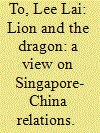| Srl | Item |
| 1 |
ID:
020077


|
|
|
|
|
| Publication |
Aug 2001.
|
| Description |
387-398
|
| Summary/Abstract |
The common view is that China is North Korea's ally. The two countries share a similar political system and considerable strategic interest in regional international relations. Indeed, this is true to a large extent. This paper, however, analyses the problems in the bilateral relations that are gradually eroding the strategic ties the two countries formed 50 years ago. Its central argument is that, in reality, beneath the surface of the alliance relations the two countries share very few common interests. In fact, the two countries can hardly agree to any matters between them, be it historical ties, ideological stance, political and economic programs, or diplomatic interactions. This heralds an uncertain future for the bilateral relations and thus may further complicate the security situation in the Korean Peninsula.
|
|
|
|
|
|
|
|
|
|
|
|
|
|
|
|
| 2 |
ID:
020080


|
|
|
|
|
| Publication |
Aug 2001.
|
| Description |
415-425
|
| Summary/Abstract |
This paper starts with some observations about developments of the post-Cold War era and their impact on Sino–ASEAN and Sino–Singaporean relations. It then surveys the relations between Singapore and China in the 1990s. The focus is on the establishment of official ties in 1990 and the economic interactions between the two sides in the last decade. Having surveyed the relations, the paper examines some of the problems for the promotion of closer cooperation. It notes the difference in the working style of both sides. In this regard, it deals specifically with the Suzhou Industrial Park and highlights the lessons that could be drawn from such a joint venture. The paper concludes by noting that Sino–Singaporean cooperation has been broadened to include defence, cultural and educational exchanges and the relationship will be more realistic and mature in the twenty-first century.
|
|
|
|
|
|
|
|
|
|
|
|
|
|
|
|
| 3 |
ID:
020079


|
|
|
|
|
| Publication |
Aug 2001.
|
| Description |
373-386
|
| Summary/Abstract |
China's relations with Japan over the past several decades have been cyclical, with periods of relative cordiality interspersed with episodes of contention. Since 1995, however, the Beijing leadership has perceived a hardening of attitudes on the Japanese side in ways that are inimical to long-term amicable relations with the People's Republic of China. This has been mirrored in Tokyo, which sees Chinese behavior as increasingly provocative. The policy directions of the two states appear more divergent as well. Periodic slight thaws in relations and numerous joint projects notwithstanding, the problems between the two defy easy solution, and may be intractable. Weak leadership in both countries may encourage extremists in each to become more assertive.
|
|
|
|
|
|
|
|
|
|
|
|
|
|
|
|
| 4 |
ID:
020078


|
|
|
|
|
| Publication |
Aug 2001.
|
| Description |
399-414
|
| Summary/Abstract |
The Sino-Russian Astrategic partnership, formed after decades of rancorous verbal (and sometimes lethal) dispute, we find to be genuine, bespeaking a genuine desire on both sides to put the past behind them and forge a more friendly and mutually profitable relationship. Certainly there are underlying problems and suspicions, but the painstakingly institutionalized, multi-stranded network of exchange and consultation seems quite capable of containing areas of friction. Though primarily oriented to bilateral concerns, the partnership also has a more ambitious international agenda, oriented essentially to the protection of national sovereignty from the forces of globalism and human rights, as typically symbolized by the United States.
|
|
|
|
|
|
|
|
|
|
|
|
|
|
|
|